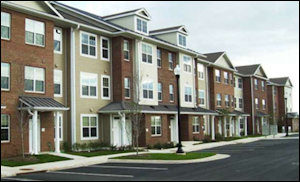One in three households in the state spends more than 30 percent of their income on housing, reports the Virginia Mercury. The apartment industry argues that housing will become unaffordable for even more as the state’s population grows faster than the housing supply.
If I were a middle-class Virginian most of whose net worth was tied up in my home equity, I expect I’d be particular about who lives near me. I probably would not be happy to discover that some developer wanted to build “affordable housing” next door. But my right to build a house on my own property does not entitle me to stop someone else from building housing on his property.
Zoning codes across Virginia empower agitated citizens to halt apartment complexes they don’t like. That’s democracy in action — majority rule. But the purpose of having a republic and rule of law is to protect minorities against the tyranny of the majority. In the case of housing, the minority is comprised of lower-income Virginians, many of whom happen to be racial/ethnic minorities as well. Zoning restrictions make it difficult for developers to build apartments, which, by their nature, cater to people who don’t make enough money to buy their own houses to live in. The cumulative result of restricted supply over the years has been a steadily increasing cost of housing, especially for lower-income Virginians.
Against this backdrop, the state Senate has passed SB 1062 outlawing discrimination against housing developments not only on the basis of race, color, religion, etc. but “because the housing development contains or is expected to contain families or individuals with incomes at or below 80 percent of the median income of the area.”
Halting a development on the basis of race is already prohibited by federal law. SB 1062 would stop the practice of turning down development on the basis of income. I’m not sure how effective it would be: Zoning boards could justify decisions based on the impact on schools, traffic, or taxes. But anything that eases the throttle on housing supply would be beneficial.
The political economy of housing cuts a number of different ways. Supporters of the legislation depict resistance to affordable housing as motivated by racism. One bill sponsor pointed to local officials in Powhatan County rejecting a zoning application after some neighbors worried that it would “lay the groundwork for a ghetto.” The standard-issue Social Justice Warrior fulmination against racism over-simplifies the issues. Indeed, implementation of social-justice policies in other arenas stiffens the resistance of homeowners who seek to protect themselves from social chaos.
Housing geared for lower-income Virginians introduces more lower-income students into neighborhood schools. Students classified as economically disadvantaged are more likely to suffer from disabilities, create disciplinary issues, and disrupt classrooms. The new social justice-inspired disciplinary regime makes it more difficult for schools to maintain order, and the education of well-ordered students suffers. Thus, social justice advocates have raised the stakes for homeowners — they worry not only about their home values but the quality of education for their children.
However, the solution to the erosion of school discipline is to reform school policies, not restrict the housing supply. Ironically, the sponsors of the housing-reform legislation — Del. Jeff Bourne, D-Richmond, and Sen. Jennifer McClellan, D-Richmond, also sponsored bills that would limit the ability of schools to refer disruptive students to law enforcement authorities. I doubt they see the irony.



